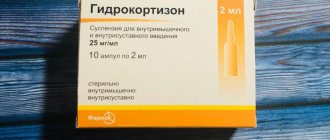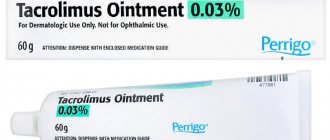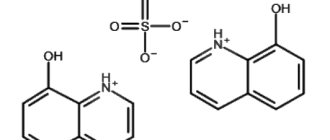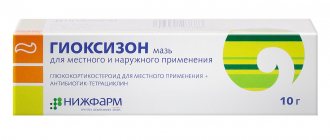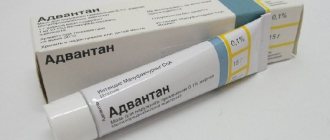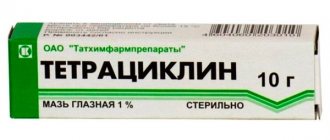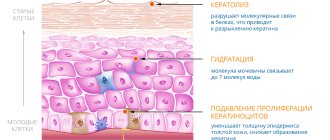How would you like to be able to purchase a medicine that could solve all existing health problems once and for all? But for now this is not possible. And therefore, everyone is forced to spend a lot of time, money and effort to maintain their physical condition at the level necessary for the normal functioning of the body. Finding a high-quality, highly specialized drug sometimes takes an incredible amount of time. This article is written to help you save some money. Below we will consider a detailed description of a drug called “Hydrocortisone-Richter”, which is actively used in modern medicine to combat a number of diseases. And in all these cases, this amazing medicine turns out to be effective, as you can see as you read. Who is Hydrocortisone-Richter indicated for? How should it be used? What are the contraindications to its use? How safe is it? Is it necessary to see a doctor or is your own knowledge sufficient to draw up an individual treatment regimen? Are there any substitutes for the drug in question? You can learn all this and some other nuances of using the drug “Hydrocortisone Richter” by reading this article.
Release form and composition
Dosage form - suspension for intra-articular and periarticular administration: almost white or white in color, with a characteristic odor (5 ml in colorless glass bottles, 1 bottle in a cardboard box and instructions for use of Hydrocortisone-Richter).
Composition of 1 ml suspension:
- active ingredients: hydrocortisone acetate – 25 mg, lidocaine hydrochloride – 5 mg;
- auxiliary components: water for injection, N,N-dimethylacetamide, sodium chloride, sodium dihydrogen phosphate, sodium phosphate, methyl parahydroxybenzoate, polysorbate 80, povidone, propyl parahydroxybenzoate.
Analogs
If for any reason (for example, the presence of certain contraindications) you are not able to use the drug "Hydrocortisone-Richter", it would be wise to find information about its substitutes in order to find a drug that is suitable for you. Thus, in terms of the main active ingredient, the analogues of the drug in question are the “Cortef” and “Solu-Cortef” suspensions. A similar mechanism of action is observed in the following drugs: “Prednisolone” (ointment for external use); "Kenalog" (suspension); "Dexapos", "Prenacid", "Maxidex", "Ozurdex" (eye ointments); “Polkotrolone”, “Medopred”, “Megadexan”, “Flosteron”, “Ivapred” (suspensions). It is important to remember that each of these drugs has its own characteristics and unique cases when it should be used. Therefore, it would be most reasonable to allow a specialist to select a suitable analogue of the drug in question that would be effective in your case and would not harm your body.
Pharmacological properties
Pharmacodynamics
Hydrocortisone-Richter is a drug of a combined composition, the effect of which is due to the properties of the active substances.
Hydrocortisone is a glucocorticosteroid (GCS) with anti-inflammatory activity. The mechanism of its action is explained by the ability to inhibit the release of cytokines (interleukins and interferon) from lymphocytes and macrophages, inhibit the release of inflammatory mediators by eosinophils, reduce the synthesis of prostaglandins and the intensity of arachidonic acid metabolism. Hydrocortisone activates steroid receptors. Promotes the formation of lipocortins, which have an anti-edematous effect. Reduces inflammatory cell infiltration, prevents the migration of leukocytes and lymphocytes at the site of inflammation. When used in high doses, it inhibits the development of connective and lymphoid tissue. Reduces the number of mast cells, thereby reducing the formation of hyaluronic acid. Helps reduce capillary permeability. Suppresses hyaluronidase. When administered intra-articularly, the therapeutic effect develops within 6–24 hours and persists for several days and even weeks.
Lidocaine is a local anesthetic with a membrane-stabilizing effect.
Pharmacokinetics
Hydrocortisone, after intra-articular and periarticular administration, penetrates into the systemic circulation. More than 90% of the dose is bound to plasma proteins. Penetrates through the placental barrier.
Lidocaine is absorbed to a large extent and binds well to plasma proteins. Penetrates through the blood-brain and placental barriers into breast milk.
Both substances are metabolized in the liver, hydrocortisone - with the formation of tetrahydrocortisone and tetrahydrocortisol, which are excreted by the kidneys in conjugated form.
The half-life of lidocaine is 1–2 hours.
Contraindications
Absolute:
- Achilles tendon diseases;
- joint infection;
- systemic infection without specific treatment;
- tendency to thrombosis;
- Itsenko-Cushing syndrome;
- I trimester of pregnancy;
- hypersensitivity to any component of Hydrocortisone-Richter.
Intra-articular administration is also contraindicated in the following cases:
- intra-articular bone fracture;
- severe periarticular osteoporosis;
- osteoarthritis without synovitis (so-called dry joint);
- aseptic necrosis of the epiphyses of the bones that form the joint;
- unstable joint;
- severe bone destruction and joint deformation (significant narrowing of the joint space, ankylosis);
- infectious (septic) arthritis or periarticular infection (including history);
- previous arthroplasty;
- pathological bleeding (endogenous or caused by anticoagulants);
- general infectious disease.
Relative contraindications to the use of Hydrocortisone-Richter (the drug should be used with caution, after assessing the benefit-risk ratio):
- osteoporosis;
- diabetes mellitus (including family history);
- peptic ulcer of the stomach and duodenum;
- chronic heart failure;
- epilepsy;
- steroid myopathy;
- glaucoma;
- history of tuberculosis;
- chronic psychotic reactions;
- arterial hypertension;
- herpes simplex (including eye);
- measles;
- II–III trimesters of pregnancy;
- lactation period;
- age over 65 years.
Generics
“Hydrocortisone” is not the only medicine in its category; there are many analogues that are suitable for indications and method of use.
Among them:
- "Dexamethasone."
- "Polcortolon."
- "Prednisolone."
- "Diprospan".
- "Solu-medrol."
- "Cortisone".
- "Hydrocortisone Acetate".
- "Solu-Corter."
The price for Hydrocortisone suspension is often higher than for other drugs, but they have completely different contraindications. Before use, you should consult your doctor.
Hydrocortisone-Richter, instructions for use: method and dosage
Hydrocortisone-Richter suspension is administered intra- or periarticularly, into no more than 3 joints in one day. Repeated injections are given at intervals of 3 weeks.
Injecting the drug directly into a joint can have a negative effect on hyaline cartilage, so injections into the same joint are allowed no more than 3 times a year.
When treating tendinitis, it is prohibited to inject the drug directly into the tendon; injections are made into the tendon sheath.
For adults, Hydrocortisone-Richter is prescribed 5–50 mg, depending on the severity of the disease and the size of the joint; for children, 5–30 mg per day in several doses.
For periarticular administration, a single dose for children, depending on age, is:
- 6–14 years – 50–75 mg;
- 1–6 years – 25–50 mg;
- 3–12 months – 25 mg.
Hydrocortisone price, where to buy
All forms of this drug are available in the pharmacy chain at affordable prices, so you can buy them without any problems. The price of Hydrocortisone ointment is 30-37 rubles, the price of eye ointment ranges from 121 to 133 rubles. The price of Hydrocortisone in ampoules (Farmak, Ukraine) is 147-155 rubles. (for 10 ampoules) A suspension of hydrocortisone with lidocaine (Gedeon Richter) costs more - 215-251 rubles for 1 bottle.
- Online pharmacies in RussiaRussia
- Online pharmacies in UkraineUkraine
- Online pharmacies in KazakhstanKazakhstan
LuxPharma* special offer
- Hydrocortisone France tablets 10 mg No. 25
RUB 1,990 order - Hydrocortisone (analogue of Cortef) table. 20 mg No. 20
RUB 1,750 order
ZdravCity
- Hydrocortisone ointment for nar. approx. 1% 15gOJSC Sintez
61 rub. order
- Hydrocortisone eye ointment 0.5% 3g JSC Tatkhimfarmpreparaty
30 rub. order
- Hydrocortisone ointment 1% 10 gAO "Nizhpharm"
30 rub. order
- Hydrocortisone-POS eye ointment. 1% 2.5gUrsapharm Arzneimittel GmbH
67 RUR order
- Hydrocortisone ointment for eyes. 0.5% 3gPharmzavod Elfa A.O.
119 RUR order
Pharmacy Dialogue
- Hydrocortisone ointment (tube 1% 10g)Nizhpharm JSC
30 rub. order
- Hydrocortisone ointment (tube 0.5% 3g) TCPP
29 RUR order
- Hydrocortisone ointment (tube 1% 10g)Biokhimik OJSC
29 RUR order
- Hydrocortisone ointment (tube 0.5% 5g) TCPP
35 rub. order
- Hydrocortisone-Richter (susp. d/sust/approx. 25 mg + 5 mg/ml 5 ml bottle No. 1) Gedeon-Richter
RUB 216 order
show more
Pharmacy24
- Hydrocortisone Acetate 25 mg/ml N10 suspension for injection PAT "Pharmstandard-Biolik", Kharkiv, Ukraine
98 UAH.order - Hydrocortisone acetate 2.5% 2 ml No. 10 PAT "Farmak", Ukraine
159 UAH order
- Hydrocortisone 0.5% 3 g eye ointment Elfa A.T. Pharmaceutical Plant, Poland
68 UAH order
- Hydrocortisone 1% 10 g ointment VAT "Nizhpharm", Nizhny Novgorod, Russian Federation
40 UAH order
- Hydrocortisone-POS 1% 2.5 g eye ointment Ursafarm Arznaimittel GmbH, Nimecchina
92 UAH order
PaniPharmacy
- Hydrocortisone ointment Hydrocotisone ointment-pos. 1% 2.5g Germany, Ursapharm
105 UAH order
- Hydrocortisone ointment Hydrocortisone eye ointment 0.5% 3g Poland, Jelfa
89 UAH order
- Hydrocortisone ampoule Hydrocortisone acetate d/in. 2.5% 2ml No. 10 Ukraine, Pharmstandard-Biolek
114 UAH order
- Hydrocortisone ampoule Hydrocortisone acetate d/in. 2.5% 2ml No. 10 Ukraine, Farmak OJSC
174 UAH order
- Hydrocortisone ointment Hydrocortisone ointment 1% 10g Russia, Nizhpharm
42 UAH order
show more
Side effects
- local reactions: pain and swelling of tissue at the injection site (go away on their own a few hours after injection), increased pain in the joint when Hydrocortisone-Richter is injected into the joint, burning, paresthesia, numbness at the injection site; with accidental injection into the deltoid muscle - atrophy of the skin and subcutaneous tissue; rarely - scar formation at the injection site, necrosis of surrounding tissues;
- from the nervous system: anxiety, dizziness, disorientation, headache, agitation, irritability, hallucinations, euphoria, insomnia, delirium, increased intracranial pressure with papilledema, depression, mental disorders, pseudotumor of the cerebellum, paranoia, exacerbation of manic-depressive psychosis , epileptiform seizures;
- from the endocrine system: steroid diabetes mellitus, manifestation of latent diabetes mellitus, decreased glucose tolerance and increased need for a hypoglycemic drug; with long-term use of Hydrocortisone-Richter - growth retardation in children and adolescents, suppression of adrenal function, Itsenko-Cushing syndrome;
- from the musculoskeletal system: osteoporosis, slowing of growth and ossification processes in children (due to premature closure of the epiphyseal growth zones); very rarely - steroid myopathy, arthralgia, tendon and muscle rupture, pathological bone fractures, decreased muscle mass, aseptic necrosis of the head of the humerus and femur;
- from the digestive system: hiccups, nausea, flatulence, increased appetite, vomiting, bleeding and perforation of the gastrointestinal tract, esophagitis, peptic ulcer, pancreatitis; rarely - increased activity of liver transaminases and alkaline phosphatase;
- from the cardiovascular system: when using lidocaine in high doses - conduction disturbances, peripheral vasodilation; when using hydrocortisone in high doses - increased blood pressure, thromboembolism, hypokalemia and its inherent changes in the electrocardiogram, heart failure;
- from the immune system: local and generalized hypersensitivity reactions (itching, skin rashes, anaphylactic shock), delayed wound healing, exacerbation of latent tuberculosis, opportunistic infections, tendency to exacerbation of infections, development of candidiasis and pyoderma (especially with simultaneous vaccination or use of immunosuppressive drugs );
- on the metabolic side: increased sweating, negative nitrogen balance, weight gain;
- from the organ of vision: exophthalmos, trophic changes in the cornea, glaucoma, secondary bacterial fungal and viral infections of the eyes, posterior capsular cataract (more likely in children), corneal ulceration, increased intraocular pressure with possible damage to the optic nerve;
- from the skin: stretch marks, steroid acne, folliculitis, telangiectasia, ecchymosis, petechiae, hirsutism, hyper- and hypopigmentation;
- other: leukocytosis, leukocyturia, malaise, withdrawal syndrome (arthralgia, myalgia, fever, adrenal insufficiency), effects caused by the mineralocorticoid activity of Hydrocortisone-Richter - hypernatremia, hypokalemia (fatigue, increased weakness, muscle spasms, myalgia, arrhythmia), sodium and fluid retention with the formation of peripheral edema.
With long-term use of Hydrocortisone-Richter in high doses, systemic undesirable effects characteristic of hydrocortisone and lidocaine may develop.
Elderly patients are more likely to experience side effects.
Overdose
There are no specific clinical symptoms for an overdose of Hydrocortisone suspension, and there is no antidote.
Overdose is characterized, first of all, by the intensification and severity of signs of local and systemic reactions.
Treatment is aimed at eliminating manifestations; In case of a dangerous overdose, extrarenal blood filtration is used.
Symptoms of overdose are:
- failure to remove water and sodium from the body;
- severe vomiting;
- increased glucose levels;
- in rare cases, gastric bleeding and hyperglycemic coma.
cimetidine or ranitidine every 6 hours .
special instructions
The Hydrocortisone-Richter suspension is administered in compliance with the rules of asepsis to avoid bacterial contamination.
During therapy, it is recommended to follow a diet that limits sodium intake, contains sufficient protein and an increased amount of potassium. Blood pressure, diuresis, blood clotting, blood glucose concentration, and the patient’s body weight should be periodically monitored.
In the latent form of tuberculosis and during the period of change in tuberculin tests, it is necessary to carefully monitor the patient’s condition, and, if necessary, carry out chemoprophylaxis.
The use of Hydrocortisone-Richter, especially in large doses, is a contraindication to any vaccination, which is explained by the high probability of insufficient antibody synthesis.
Relative adrenal insufficiency may persist for several months after discontinuation of hydrocortisone. In this regard, in stressful situations, it is recommended to resume hormonal therapy with the simultaneous administration of mineralocorticoids and salts.
Reviews
What do people say about the effectiveness of the drug in question? Reviews about the drug "Hydrocortisone-Richter" are left by both patients and attending physicians. The vast majority declare its unconditional effectiveness, amazing results in a short period of treatment, as well as a lasting effect (there is no need to repeat the course many times). These reviews indicate that the drug is truly trustworthy and you should pay attention to it.
However, there is another side to the coin. Namely: sometimes patients complain of negative side reactions after using the drug in question. Sometimes they cause a lot of inconvenience and require specific treatment. Sometimes much more serious symptoms occur, for example, delay in the development of the child. However, all these consequences can be avoided if you carefully study the instructions for use of the drug. It clearly lists all possible side effects and emphasizes the need for medical supervision. If you allow the attending physician to lack control over the patient’s condition (especially if it is your own child), be prepared to face some unpleasant consequences. It is better not to allow the situation to develop in this way and pay enough attention to following all recommendations. Self-medication with the drug in question is unacceptable and dangerous.
Now you are fully armed. Having received such comprehensive information about the drug "Hydrocortisone-Richter", you can make a truly informed decision as to whether it is worth using it in your individual case. But even if it turns out that this is exactly what you need now, do not rush to purchase and use the medicine. Take the time to discuss this type of treatment with your doctor. He will be able to build a treatment plan taking into account all the existing nuances and will help you avoid all the pitfalls, of which there are many, when using the drug in question. Indeed, despite all its undeniable effectiveness, Hydrocortisone-Richter has many side effects that entail quite serious consequences. Only a competent specialist can help avoid their development, under whose supervision it is recommended to treat with this drug. Only in this case will this kind of therapy bring you invaluable benefits, relieving you of the unpleasant symptoms of the disease. By spending a little time consulting with your doctor, you can save a lot of money and your own emotional and physical strength, which otherwise would have to be spent on dealing with severe adverse reactions and complications. The more consciously you treat the health of your body, the more grateful it will be to you for many years to come.
Always choose only the highest quality treatment for yourself and your family! All the best!
Use during pregnancy and lactation
In the first trimester of pregnancy, Hydrocortisone-Richter is contraindicated, since there is no data on its safety in this period. In the II–III trimesters, the drug can be used only if the expected benefits outweigh the potential risks. Neonates exposed in utero to hydrocortisone should be monitored for the development of adrenal insufficiency.
The active substances of the drug penetrate into mother's milk. You should use Hydrocortisone-Richter with extreme caution during lactation or avoid breastfeeding.
Indications
The main diseases for which the use of the drug "Hydrocortisone-Richter" is indicated are glenohumeral periarthritis, tenosynovitis, osteoarthritis in the presence of synovitis (does not apply to infectious arthritis), as well as bursitis, rheumatoid arthritis and epicondylitis.
Today, the drug in question is increasingly used to combat a variety of diseases of the respiratory tract, larynx and nasopharynx (laryngitis, asthma, bronchitis, sinusitis, runny nose, etc.), as well as the ears (otitis media of varying severity).
Drug interactions
- steroid synthesis inhibitors (including mitotane): the effect of hydrocortisone decreases (increasing the dose may be required);
- barbiturates, phenytoin, theophylline, ephedrine, rifampicin and other inducers of microsomal liver enzymes: the effect of hydrocortisone is reduced;
- thyroid hormones: increased clearance of hydrocortisone;
- paracetamol: the risk of developing its hepatotoxic effect increases (due to the induction of liver enzymes and the formation of a toxic metabolite of paracetamol);
- acetylsalicylic acid: its elimination accelerates, the concentration of salicylates in the blood decreases (with the withdrawal of Hydrocortisone-Richter, the content of salicylates in the blood and the risk of side effects increases);
- estrogens (including oral estrogen-containing contraceptives): the clearance of hydrocortisone decreases, its half-life increases, therapeutic and toxic effects increase;
- other glucocorticoids, antipsychotics, azathioprine and carbutamide: increases the risk of developing cataracts;
- tricyclic antidepressants: the severity of depression caused by hydrocortisone may increase (if depression develops during the use of Hydrocortisone-Richter, the use of tricyclic antidepressants is contraindicated);
- Coumarin derivatives: anticoagulant effect increases;
- immunosuppressants: the risk of developing infections, lymphoma and other lymphoproliferative disorders associated with the Epstein-Barr virus increases;
- oral hypoglycemic drugs: their effect decreases;
- cardiac glycosides: their toxicity increases (risk of arrhythmias due to hypokalemia);
- ethanol, nonsteroidal anti-inflammatory drugs: the likelihood of ulceration of the gastrointestinal mucosa and bleeding increases;
- indomethacin: the risk of developing its side effects increases;
- other glucocorticoids, carbonic anhydrase inhibitors, thiazide diuretics, amphotericin B: hypokalemia may develop;
- sodium-containing medications: swelling and increased blood pressure may occur;
- somatropin: its effect decreases (if Hydrocortisone-Richter is used in high doses);
- isoniazid, mexiletine: their metabolism increases, causing plasma concentrations to decrease;
- ketoconazole: the toxicity of hydrocortisone increases;
- vitamin D: its effect on calcium absorption in the intestinal lumen is weakened;
- carbonic anhydrase inhibitors, amphotericin B: increases the risk of developing osteoporosis;
- nitrates, m-anticholinergics (including antihistamines, tricyclic antidepressants): intraocular pressure increases;
- steroid hormonal drugs (androgens, estrogens, anabolic steroids, oral contraceptives): acne and hirsutism may occur;
- muscle relaxants: it is possible to increase the duration and severity of the muscle blockade induced by them due to hypokalemia caused by hydrocortisone;
- live (attenuated) vaccines and other types of immunizations: the risk of viral activation and the development of infections increases.
